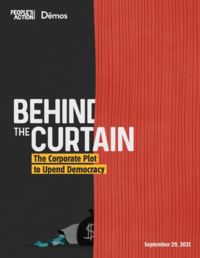Executive Summary
Right now, corporations and the ultrarich are spending millions to derail President Biden’s Build Back Better plan. They want to keep the trillion-dollar tax cuts Trump gave them so they can reap obscene profits year after year at our expense. They are working behind the scenes to make pandemic windfalls permanent and keep our elected officials from taking action to restore communities.
People’s Action and Demos have teamed up to reveal this power grab and uncover how corporate America wants to make inequity a permanent part of American life. We zero in on who is spending big to stop the Biden plan in key sectors: taxes, drug pricing, healthcare, housing, the environment, and immigration. We name the corporate bad actors and show how their efforts undermine our democracy as well as our economy. We explain what the Build Back Better agenda proposes, and what current polls tell us the people want.
Introduction
In a healthy democracy, people work together across differences of race and place, using their government to build and protect everyone’s well-being. But for too long, wealthy special interests have used their power and influence to divide us, exploit our people and communities, and snatch up obscene wealth at our expense. That’s why the gap between the rich and society keeps growing, and why for decades our government has failed to make the investments needed for everyone to thrive.
The fight over President Biden’s Build Back Better agenda is no exception. Corporations and the ultrarich are spending millions of dollars lobbying to preserve the billions they extort from exploited workers and to prevent us from taking needed action to protect our communities.
In August, the Senate passed the Infrastructure Investment and Jobs Act and a package of proposals to be adopted through budget reconciliation. These would join the Coronavirus Aid, Relief, and Economic Security (CARES) Act and American Rescue Plan (ARP) to create a total investment of more than $7 trillion in working people and communities, a level of support not seen since Franklin D. Roosevelt’s New Deal.
Biden proposes long-overdue investments in roads, bridges, and clean water as well as critical funding for social infrastructure, such as the Child Tax Credit, home-based care, and paid leave. These measures dramatically reduce poverty and support those whose work is most essential to our economy.
Three out of 4 voters and 90 percent of Democrats support the infrastructure bill and budget plan created by Congress and the Biden administration.
They want the federal government to use its resources—their resources—to put our country and its people on a firm footing.
Corporate America, however, wants to keep profits high and taxes low forever. They simply don’t want to pay their fair share. That’s why they’re throwing millions of dollars into lobbying, campaigns, and political advertising to divide us and get legislators to back their agenda of permanent inequality.
As Congress takes on this historic legislation, corporations and their conservative political allies are spreading timeworn lies about “deficit spending” and “big government.”
But these attacks are simply an effort to shore up an unequal status quo: to shield the profits of the wealthiest Americans and maintain their decision-making power at everyone else’s expense. Consider that during the pandemic, U.S. billionaires’ collective fortunes grew by $1.8 trillion—nearly half of the Biden administration’s proposed $3.5 trillion package. And that the Trump tax cuts, if not reversed, will add close to $2.3 trillion to the national debt.
Let’s not forget: The $3.5 trillion being proposed in Congress is already a major compromise.
Every dollar spent is a necessary investment in our communities, and our people cannot afford to be undermined even more by corporate actors.
This debate is about priorities, not resources. We can grow the economy while we invest in people and the planet if we act on collective values that put our shared future over the wealth and control of a few.
Download the Full PDF


